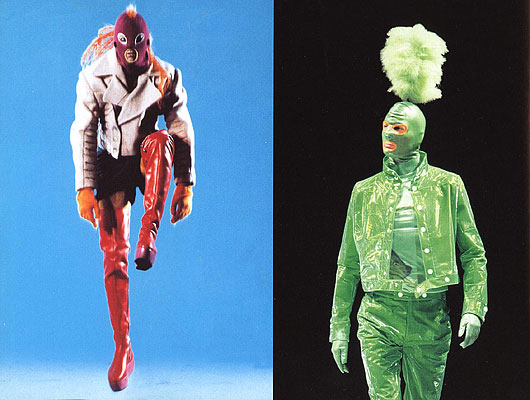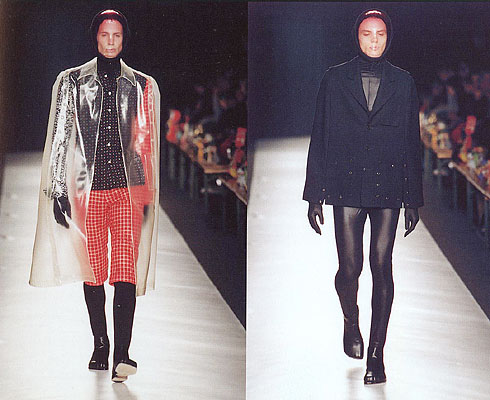|
BELGIAN FASHION DESIGN
|
FUNCTION ( p r a g m a t i c s ) |
||||||||||||||||||
| WALTER
VAN BEIRENDONCK: "I find it very frustrating that we are so limited.
Fashion, as an industry, is miles behind. I have gone very deeply into functionality,
I started to look at other disciplines 10 years ago. I visited textile exhibitions
to look for all kinds of material that would 'breathe'. At that time I had
regular contact with a manufacturer, and I found it frustrating that I couldn't
use those materials. "One of the disadvantages of fashion is that we are supposed to be concerned with the packaging, which tends to overshadow the purely functional, which therefore fades into the background. Very few designers seem to be concerned about this, which means there is nothing to encourage or stimulate the industry. "You might say that experiments are carried out with materials, but it mostly happens in the world of sport, where it really belongs, because there is no other way of doing that kind of research. In fashion that kind of thing is often dismissed as too expensive, pointless, uninteresting. "In my latest show I showed each model, very symbolically, in an overall made out of high-tech material. To my way of thinking, ultimately that is the only piece of clothing that can function perfectly as a garment, that can breathe when you're hot, provide instant warmth when it's cold, and adjust itself to all circumstances. In the end, what you wear on top is merely for decoration. "One day there will have to be some sort of industry, which produces purely functional, basic pieces of clothing, over which people will be able to wear an outfit designed by me or some other designer. "It's a pity that we can't optimise something like this. In the sixties there was a revival of technical research into functionality. Paco Rabane and Cardin experimented with pre-shaped clothing, pre-cast garments; but that's all in the past now. Those experiments were all written off. Which is a pity. The idea was not taken seriously, was treated as a futuristic fantasy. But research was done. Now it has all gone down the drain, I think because of the move to low-wage countries. Instead of optimising and developing the industry here, they've installed their written-off machinery somewhere else, and fallen back on existing patterns. When finally the wage advantage has all been used up, perhaps they'll have to re-think, and innovate. Then we'll be able to start moving forward again. There has been a revival, but it was followed by an enormous decline. I suppose one day people will pick up the thread again, because there will be no other alternative. Then they'll look for other solutions. After all, they can't manufacture on Mars." |
|||||||||||||||||||
| WALTER
VAN BEIRENDONCK Walter Worldwide Autumn/Winter 1989-90 'Hardbeat'. Photo : Ronald Stoops |
WALTER
VAN BEIRENDONCK W.&L.T. Autumn/Winter 1995-96 'Paradise Pleasure Productions'. Photo: Chris Rügge |
||||||||||||||||||
 |
|||||||||||||||||||
| WALTER
VAN BEIRENDONCK Walter Van Beirendonck Autumn/Winter 1999-2000 'No References'. Photo: Dan Lecca. |
|||||||||||||||||||
 |
|||||||||||||||||||
